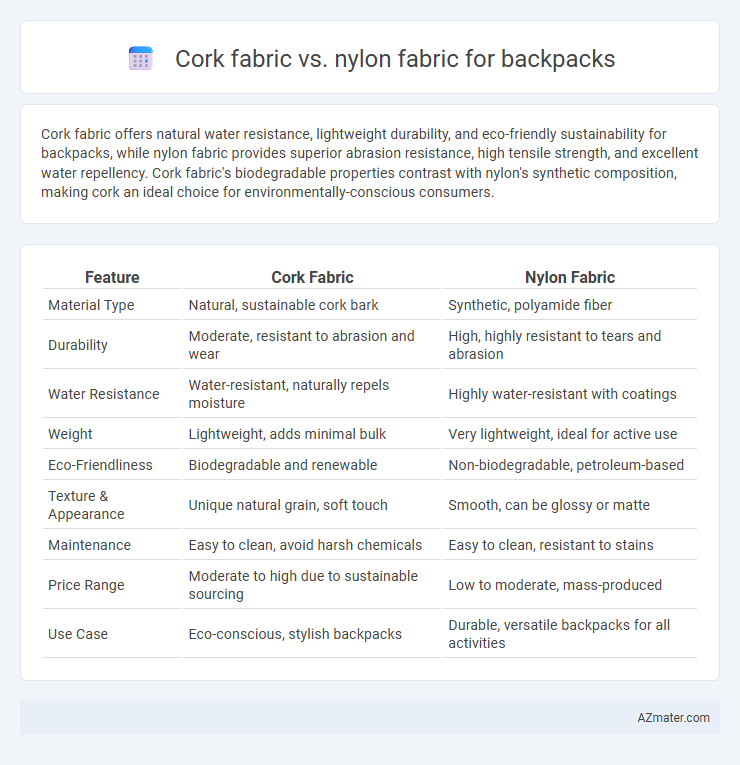Cork fabric offers natural water resistance, lightweight durability, and eco-friendly sustainability for backpacks, while nylon fabric provides superior abrasion resistance, high tensile strength, and excellent water repellency. Cork fabric's biodegradable properties contrast with nylon's synthetic composition, making cork an ideal choice for environmentally-conscious consumers.
Table of Comparison
| Feature | Cork Fabric | Nylon Fabric |
|---|---|---|
| Material Type | Natural, sustainable cork bark | Synthetic, polyamide fiber |
| Durability | Moderate, resistant to abrasion and wear | High, highly resistant to tears and abrasion |
| Water Resistance | Water-resistant, naturally repels moisture | Highly water-resistant with coatings |
| Weight | Lightweight, adds minimal bulk | Very lightweight, ideal for active use |
| Eco-Friendliness | Biodegradable and renewable | Non-biodegradable, petroleum-based |
| Texture & Appearance | Unique natural grain, soft touch | Smooth, can be glossy or matte |
| Maintenance | Easy to clean, avoid harsh chemicals | Easy to clean, resistant to stains |
| Price Range | Moderate to high due to sustainable sourcing | Low to moderate, mass-produced |
| Use Case | Eco-conscious, stylish backpacks | Durable, versatile backpacks for all activities |
Introduction to Cork vs Nylon Backpacks
Cork fabric, harvested from the bark of cork oak trees, offers a natural, sustainable, and water-resistant alternative for backpacks compared to traditional nylon fabric. Nylon, a synthetic polymer known for its high durability, lightweight properties, and resistance to abrasion, remains the standard choice for backpacks in outdoor and urban environments. Choosing between cork and nylon backpacks depends on preferences for eco-friendliness and natural texture versus performance-oriented features like strength and quick drying.
Material Origins: Cork and Nylon Explained
Cork fabric is a natural, sustainable material harvested from the bark of cork oak trees, known for its eco-friendly properties and unique texture. Nylon fabric is a synthetic polymer derived from petrochemicals, valued for its strength, durability, and water resistance. Choosing between cork and nylon for backpacks depends on prioritizing environmental impact versus performance characteristics like abrasion resistance and lightweight construction.
Environmental Impact: Sustainability Comparison
Cork fabric, derived from the renewable bark of cork oak trees, offers a highly sustainable alternative to nylon fabric in backpack production due to its natural biodegradability and minimal environmental footprint. Nylon, a synthetic polymer made from petrochemicals, requires significant energy consumption and releases greenhouse gases during production, contributing to environmental pollution and resource depletion. Choosing cork fabric supports sustainable forestry practices and reduces reliance on fossil fuels, making it a more eco-friendly option for environmentally conscious consumers.
Durability and Strength Analysis
Cork fabric offers remarkable tear resistance and water repellency, making it highly durable for lightweight backpacks, while nylon fabric excels with superior tensile strength and abrasion resistance, ideal for heavy-duty, rugged use. Nylon's synthetic fibers provide enhanced resistance to wear and environmental factors compared to cork's natural cellulose-based composition, which can be more prone to surface damage under extreme conditions. For backpacks requiring long-term durability and strength in harsh environments, nylon fabric typically outperforms cork fabric, although cork remains a sustainable, eco-friendly alternative with moderate durability.
Water Resistance and Weather Performance
Cork fabric offers natural water resistance due to its dense cellular structure, preventing moisture absorption and providing excellent weather durability for backpacks in wet conditions. Nylon fabric typically features a synthetic water-repellent coating, ensuring effective water resistance, but performance can degrade over time with wear and exposure to harsh weather. Cork's sustainable and breathable properties contribute to superior mold resistance compared to nylon, making it a more reliable choice for long-term weather performance.
Comfort and Flexibility in Daily Use
Cork fabric offers a soft, breathable texture that enhances comfort during extended wear, making it ideal for backpacks used in daily commuting or casual activities. Its natural flexibility allows the material to conform gently to body movements without causing stiffness or discomfort. Nylon fabric, while durable and water-resistant, tends to be less breathable and can feel stiffer, potentially reducing overall comfort and flexibility in everyday use.
Weight and Portability Factors
Cork fabric is significantly lighter than nylon fabric, enhancing backpack portability without sacrificing durability or water resistance. Cork's natural, renewable properties offer a sustainable and flexible option that reduces overall pack weight, making it ideal for lightweight travel and hiking gear. Nylon fabric, while sturdy and abrasion-resistant, tends to be heavier and less environmentally friendly, potentially impacting comfort during extended use.
Style, Texture, and Aesthetic Appeal
Cork fabric offers a natural, eco-friendly texture with a unique, slightly rough surface that ages gracefully, providing a warm and sophisticated aesthetic for backpacks. Nylon fabric is sleek, smooth, and highly durable, delivering a modern and sporty look with vibrant color options and water-resistant properties. While cork appeals to environmentally conscious users seeking organic style, nylon attracts those prioritizing functionality and contemporary design.
Pricing and Market Availability
Cork fabric, often priced higher due to its eco-friendly and sustainable production process, is less commonly available in mainstream backpack markets compared to nylon fabric, which boasts widespread accessibility and cost-effectiveness. Nylon remains a popular choice for budget-conscious consumers seeking durable, water-resistant backpacks, with prices typically lower than cork alternatives. Market trends indicate increasing demand for cork fabric in niche, premium segments, though its overall availability is limited relative to the mass-produced nylon options.
Summary: Which Fabric Wins for Backpacks?
Cork fabric offers superior sustainability, water resistance, and a unique natural aesthetic, making it an excellent eco-friendly choice for backpacks. Nylon fabric excels in durability, abrasion resistance, and lightweight performance, ideal for high-activity or rugged use. For eco-conscious consumers prioritizing style and environmental impact, cork fabric wins, while nylon remains the best option for heavy-duty, long-lasting functionality.

Infographic: Cork fabric vs Nylon fabric for Backpack
 azmater.com
azmater.com